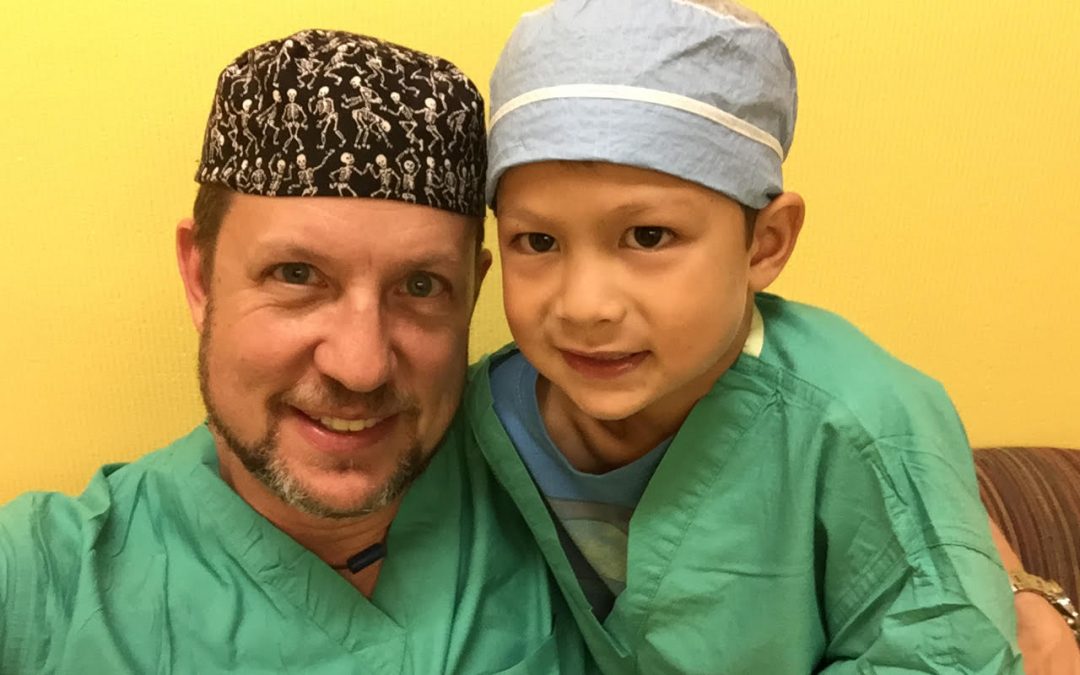I’ve been taking care of children as a doctor for over 15 years (4 years as a primary care doctor in the Air Force, 2 as a pediatric surgery fellow, and over 10 years in practice). In that time I’ve probably been involved with well over 6,000 children getting ready for surgery. In addition, I’ve been a father for 13 years now and in that time we’ve dealt with surgery, broken bones, numerous immunizations and office visits, and many minor procedures.
Most kids are brave. I’m not saying most children are not scared. They don’t run away screaming; they are brave in the face of their fear. I find that the only kids whose bravery really falters are those whose parents are visibly anxious about it. Much like the saying that dogs can smell fear, children are astute at reading their parents emotions. So what can we as doctors and parents do to help alleviate that fear for children who will need surgery? I think most fear stems from the unknown. Think about a horror movie. When are you scared? Not when the monster is attacking the hero, but when the hero is safe and you don’t know when the attack will be. It’s the same thing when riding a roller coaster the first time. I don’t know about you, but my heart is racing on the slow ride up, not when I’m zooming down. The best thing we can do for children to get them ready for surgery is to let them know what to expect. I’ve seen kids absolutely terrified the day of because their parents told them they are going to the movies and brought them in for surgery. Don’t be that parent.
I work at a freestanding children’s hospital. The goal of each and every person working there is for our “little” patients to have a great experience. We minimize or eliminate pain as much as possible. We have a whole crew of people devoted to improving the visit for the kids. From child life specialist, to music therapists, to volunteers who dress up as clowns or who bring in therapy dogs, my institution devotes a lot of resources to informing and distracting children so they have a positive time.
It helps if the child understands why he needs an operation. For example, if he needs his tonsils out, you can mention how he’s always getting sick, needing to go to the doctor, and having to take medicine. You can explain that the doctor will be fixing the part of his body that makes him sick. Children are scared to know they will be away from their parents. Make sure your son or daughter knows you will be with them before and be there for them after the procedure. I find that frequently they are worried about the specifics of anesthesia. For the little ones, there is nothing painful done while they are awake and they need to know this. They should know that they will breathe through a mask until they are asleep. They won’t feel anything at all then they will be awake with their parents. For particularly anxious patients (and parents!), Nicklaus Children’s Hospital, where I work, offers pre-surgical orientation. This is a way, in a non-threatening environment, children and their parents can visit the operating area and experience things like scrubs, gurneys, gowns, gloves, and monitoring equipment prior to surgery so that on the day of the operation, much is familiar. Ask if your hospital offers something similar.
One of the reasons I love being a pediatrician is the outstanding resiliency of children. Please contact me if you have any questions about getting your child ready for surgery.
Here are some links to useful resources:
- The Children’s Hospital of Philadelphia has age-based recommendations.
- One of my colleagues, Kathryn Anderson, wrote a book that is available for free download.
- Cleveland Clinic’s Child Life Department has a workbook you can download and print out for you to complete with your child.
- Here’s an article written by a psychologist mom with some tips.
- And a short article about the role of the Child Life Specialist.
- Miami Associates in Pediatric Surgery
